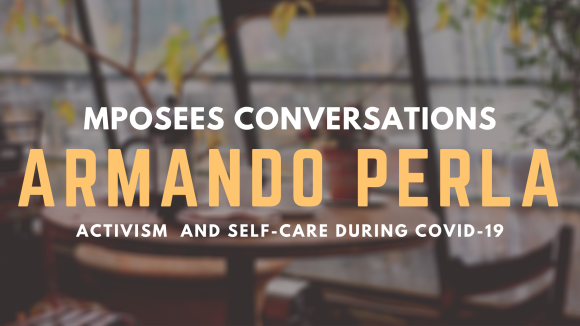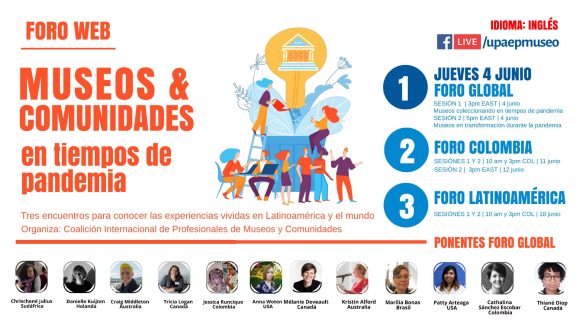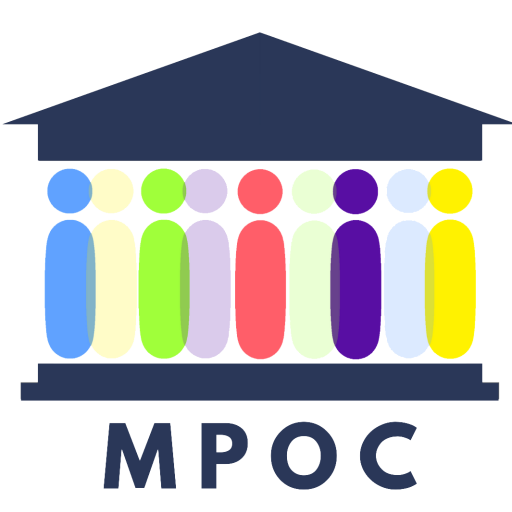
May 2020
Armando Perla, an international activist in the museum field, speaks about keeping busy during the pandemic as his own form of self-care.
“I was kind of lost, and kind of like, what’s going to happen now? But all of this would not have been possible if not for this amazing network of people around the world that care about these issues. So this is self-care.”
Armando Perla
Denise: Hi again, Armando! It’s been lovely getting to meet you and getting to know you over Instagram. As we mentioned, we’ve gotten to read some of your work and some of the projects you’ve been involved with. But to start off the interview, would you be able to formally introduce yourself to us and the work you do, and so on?
Armando: Yes, my name is Armando Perla and I was trained as a human rights lawyer, and then I started doing museum work a little bit over ten years ago. I was part of this team that developed the Canadian Museum for Human Rights (CMHR). After that, I moved to Sweden to also help with the development of another museum over there on migration and democracy, and I’ve been doing consulting and doing a lot of collaborating with different organizations in Latin America and Europe, and North America as well. Right now I am acting as an international advisor on museums, human rights and Social Inclusion for the City of Medellín; so supporting the work of a lot of different museums and also some cultural organizations over there. They’re doing amazing work, we’ll talk about it later, but they are just fantastic!
Denise: That’s awesome! That sounds like you’ve got a lot of things on your plate and keeping busy. Just to get to know you a little bit more, what have you been up to these days and how have you been practicing self-care during quarantine while also being so active in work?
Armando: You know, we’re living in really crazy times right now and all of this has really made everyone rethink the way that we work, rethink our lives, rethink our structures, like our society, all of that. So, it hasn’t been an easy time. When all of this happened, I was in the midst of switching positions. I was supposed to have moved to Medellín a couple of weeks ago, and we decided to actually leave earlier so we left at the beginning of March. So all of this really destabilized everything because it meant, okay, the borders are closed now, I can no longer go to Medellín, Colombia, to start a job. I already went here [to Montreal], so we already sold our place in Sweden, we had to leave and do all of this and we didn’t know what we were going to do, so we decided to sort of plunge into it, like as a leap of faith and say, okay, well let’s move back to Montreal, let’s be home, and then we will see what will happen and what we can do.
It was really destabilizing because I felt like I have nothing right now because Medellín is not for sure, but then I have my mom’s words in my head being like, “When things get hard, just work harder! Don’t get distracted, work harder,” right? [Laughter] So I got into all of these things and projects and started collaborating with a lot of different people from around the world from the beautiful connections that I’ve made over the years – people who work for inclusion in museums, for change in museums, and the way that we do [things], and that’s kind of what I started to do. I started to work, work, work. And then I said, well I’m in Montreal right now, I have the time, I should probably focus on getting that PhD that I have been wanting to do for so long and I haven’t found the time. So I started working on an application to do the doctorate, and that was also a very intense time. I was working with Jennifer Carter [Director of Graduate Studies in Museology at UQaM], who’s going to be my director. While at the same time organizing a lot of different things that I’ll tell you about. I’m happy to say that I got the acceptance letter from the doctorate a couple of days ago, so that’s also exciting.
*Please note that as of September 2020, Armando is now studying at the University of Montreal, under the supervision of Analys Hernandez.
Dominica: Congratulations!
Armando: Thank you! It’s going to be on the lack of inclusion in leadership positions in Canada, but I want to compare it with the US, the UK. Yesterday I had a meeting with Nicole Ivy, who was the first Director of Inclusion [at the AAM] because she’s going to be one of my readers, as well. She also offered for me to go and be a visiting scholar at [George Washington University]. I think that will also be pretty amazing and I’m very excited, and then talking with her gave me so much insight on other ways of thinking about diversity. My frame of reference is law, it’s human rights, but I know it’s an imperfect framework, it’s not enough.
Human rights is not really a critical discipline, and so it lacks a lot of different things. And she said, “Well, you know, I’m sorry to tell you but DEI also doesn’t work.” [Laughter] What we concluded is exactly that it’s dependent on people, and how people use all these different frameworks in human rights, in peacebuilding. In DEAI [diversity, equity, accessibility & inclusion], what is going to make them work is the people – how people use it, and how people manipulate them to be able to further their practice, which is I guess what I’ve been doing for the last ten years as well. So we concluded that the best way to go about this [research] is to look at the way that people use all these different frameworks and then combine and see what works best, depending on the context. So, I’m going to be including Medellín as well because they’re just doing amazing work, and probably looking at South Africa as well.
It was really amazing to see this system that they created where they are actually using the museum to be on the ground, to assist, because this museum has developed all these really amazing relationships with the communities that are around it.
That’s the academic part of it, but there’s also all the practical stuff. For the first month, [I was] completely immersed in working on this application, but then I emerged out of it and started to see, hey what’s happening with museums actually around the world? Then, I started working virtually and supporting the role of the museums in Medellín, and I started to see what they’re doing. It was really amazing because Museo Casa de la Memoria is the one that I’ve been working with the most right now, because I work for the City of Medellín. It was really amazing to see this system that they created where they are actually using the museum to be on the ground, to assist, because this museum has developed all these really amazing relationships with the communities that are around it. There are also people who are living below the poverty line here [in Montreal], but there’s a lot of people who are in extreme poverty in Medellín who don’t have access to technology, who don’t have access to being able to work from home, to self-isolate, so all these people are really in need of assistance. And the city is aware of this, so they saw an opportunity in that relationship the museum has created with all of these communities, to go assist and identify what the needs are in the community, to bring back this information to act quickly, bring in the homeless as well, to temporary shelters so they can self-isolate and can practice better social distancing. They have been bringing food to all these homes, and this is all the museum. Like, it is mind-blowing!
The case of Museo Casa de la Memoria is very particular because they have been working with the municipal government, so they have training in hospitals, they have all the safety protocols and are working within all of these parameters. However, it is difficult for just any museum to go and decide to do all this because you don’t want to spread the infection. With all these conversations across the globe that we were having, we realized, well maybe this is something that we need to talk about, because it’s not all museums who are working with communities. So, how can we bring all of these museums that are working with communities together and create a forum so we can exchange ideas, strategies, and see how we can assist if there is a need?

We decided to develop these three events that we’re going to start in the first week of June [2020]. One is going to be global, it’s going to be what museums around the world are doing with their communities – it’s all about communities during the time of COVID-19. We have people from Australia, from New Zealand, from South Africa, from the Netherlands, from Brazil, Mexico, Colombia, US, Canada, all of these different people coming together. This one is going to be in English [watch session II of part I here]. Then, we’re going to have two more events that are going to be in Spanish, and also with sign language. There’s a small gallery that is in downtown Medellín, they’re fantastic, they work with the trans community, with the sex-worker community, so they’re also doing stuff now with their communities, like trying to bring assistance. There’s lots of amazing work like that happening.
I’ve also been working with the Smithsonian National Museum of American History. I connected them with the team from Museo Casa de la Memoria. We had an amazing meeting, I mean there was crying and all of this because I was just blown away. I’ve been working a lot with a lot of the Latinx curatorial assistants that are working at the Smithsonian. Again, it’s a new generation coming, there’s hope as well, they’re amazing, they’re fabulous, they’re also bringing Nancy Bercaw, who is an amazing ally as well, and she’s fantastic, she’s head of the curatorial section of political history. Anyways, so we had that meeting, it was fabulous, and then we thought, okay, Museo Casa de la Memoria also wants to start an oral history project with migrants because they have all the Venezuelan migrants, asylum seekers, non-status migrants coming to Colombia, to Medellín, and it’s become this city of refuge. So I’ve been sort of talking about oral history and how we can do things, because the Smithsonian is also working on an oral history project with undocumented migrants, but also formal history with the Latinx community who were affected by 9/11.
There’s all these different interesting projects and they also have to do with oral history, so I thought, we’re all trying to figure out how we can continue to do oral histories in this time of pandemic when we can’t really go out and do all of this. I talked to my friend, Tricia, who is the director of research at the Residential School History and Dialogue Centre at UBC [the University of British Columbia]. She’s an Indigenous scholar, a genocide scholar, also was a curator at the CMHR – we shared an office, so we’re very close and she’s fantastic. She’s been working on oral histories with a lot of the [Residential School] survivors, and they only have access to a lot of the survivors through Facebook or through this and that, because they’re in remote areas. And so they’re already planning to do oral history collecting and archiving of these stories and testimonies digitally, so they will already be prepared for that. So I thought, oh, we should create something like this!
I thought about, as well, Craig Middleton, who is a curator at the National Museum of Australia, who is now their lead of the contemporary collecting project during COVID-19. He is also the author of Queering the Museum, that just came out in November. He’s amazing too, he’s really fabulous. So I thought, why don’t we bring all these people together. So I’ve set up another meeting for the Smithsonian, Casa de la Memoria, the National Museum of Australia, and Tricia and the Residential School History and Dialogue Centre.
The ICOM Secretariat as well, the one in Paris, asked me if I could develop a Massive Open Online Course (MOOC), which will be on museums working with historically marginalized communities. I’m doing it with Marilia Bonas, who is the Director of the Museum of the Portuguese Language in Brazil; she’s amazing. We’re really excited because it’s sort of like us being able to infiltrate and influence all of these other museums around the world. Because we know ICOM is a very conservative organization— it’s very political— so it doesn’t move as fast as we would like it to. But, we are very lucky to have really strong allies inside of ICOM.
So, I’m working with Marilia on developing that, but it’s a proposal and it has to be approved, but they asked us for it, and I think there’s a lot of good will for us to do it, they’re very excited. They were really happy with the program that we delivered and created for them that we delivered in Cali, in Colombia, so from that, this idea came, and this course will be available probably early next year.
I think those are the things I’ve been working with. It’s not a lot of self-care and leisure, it’s all work, that’s it. [Laughter]
Denise: [Laughter] We all self-care differently.
Armando: Yes, and I think it started because I was in such an unstable sort of position, not knowing what was going to happen. Am I even going to have a job? But then hopefully all of these things have started to materialize, and following my mom’s advice, “just work harder,” it worked. [Laughter]

About Armando Perla
Armando Perla is an independent consultant, activist, and curator. He is a Board Member of ICOM’s International Committee of Ethical Dilemmas (IC-Ethics). He was part of the founding teams of the Canadian Museum for Human Rights and the Rörelsernas Museum (The Swedish Museum of Migration and Democracy). He collaborates with museums, cultural institutions and communities on issues of social justice, human rights and DEAI in Canada and abroad. He has been an International Advisory on Museums, Human Rights and Social Inclusion for the City of Medellin, Colombia. Armando has also taught the “Human Rights Law” course at the faculty of law at the University of Manitoba and has been a guest lecturer in human rights and museum studies programs in several universities in North America, Latin America and Europe.
Before working in the museum sector, he worked for several human rights NGOs and academic institutions in Canada and abroad. Armando holds a Bachelor of Laws from l’Université Laval in Canada and a Master of Laws in International Human Rights Law from Lund University and the Raoul Wallenberg Institute of Human Rights and Humanitarian Law in Sweden. He is currently pursuing a doctorate in Art History and Museology at the University of Montreal.

